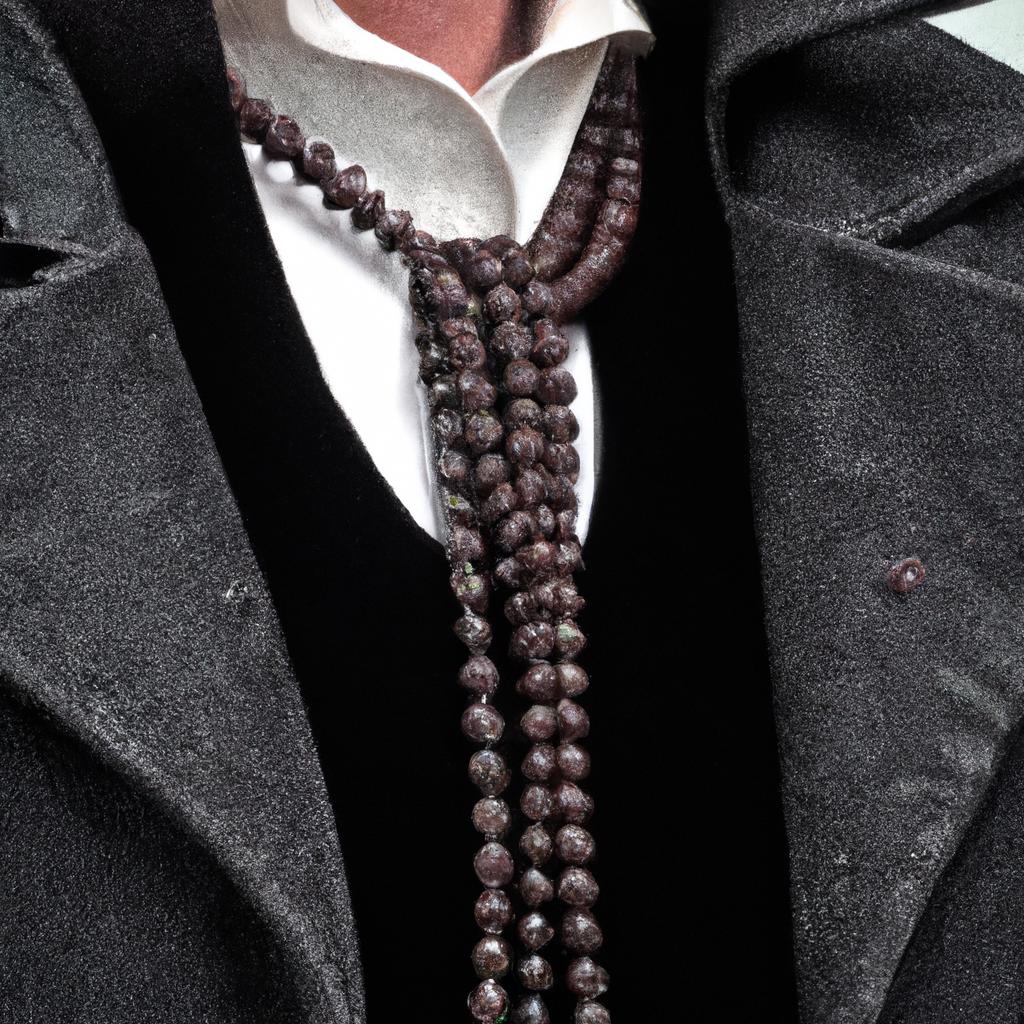As experienced attorneys who specialize in the intricacies of etiquette and protocol, we often field questions from clients grappling with the appropriate attire for somber occasions, such as funerals. The question of whether one must wear a tie to a funeral is a common one, and warrants a thoughtful examination of cultural norms and personal preferences. In this article, we delve into the nuances of funeral attire, offering guidance on when a tie is a necessity and when it may be optional. Join us as we navigate the delicate balance between tradition and individual expression in times of mourning.
Considerations Before Decide to Wear a Tie
When deciding whether to wear a tie to a funeral, there are several considerations to keep in mind. First and foremost, it is important to remember that a funeral is a solemn occasion where respect and decorum are paramount. Wearing a tie can be a sign of respect for the deceased and their family, as it is a traditional symbol of mourning and formality.
However, it is also important to consider the specific customs and traditions of the family and culture in which the funeral is taking place. In some cultures, wearing a tie may not be necessary or may even be considered inappropriate. Additionally, the relationship you had with the deceased and their family may also influence whether or not wearing a tie is appropriate. Ultimately, it is important to dress in a way that is respectful and in keeping with the tone of the funeral.

Traditional Etiquette Surrounding Attire for Funerals
When attending a funeral, it is important to adhere to traditional etiquette surrounding attire to show respect for the deceased and their family. In most cases, wearing a tie is considered appropriate and respectful attire for a funeral. A tie symbolizes formality and respect, making it a common choice for men attending funerals. While not always required, wearing a tie can help you blend in with the somber atmosphere of the event and show your respect for the deceased.
While wearing a tie is generally a safe choice for a funeral, it is important to consider the specific wishes of the family or any cultural or religious customs that may dictate appropriate attire. If you are unsure whether a tie is necessary, it is best to err on the side of caution and wear one to show your respect for the deceased and their loved ones. Remember, dressing appropriately for a funeral is a small but significant way to honor the life of the deceased and to support their grieving family.

Respectful Alternatives to Wearing a Tie
While it is traditional to wear a tie to a funeral as a sign of respect, there are respectful alternatives that can be considered depending on the specific circumstances. It is important to keep in mind the wishes of the deceased and their family, as well as any cultural or religious customs that may influence dress code etiquette.
Some to a funeral include:
- Dark Suit: A dark suit in black, navy, or gray is a classic and formal option that conveys respect without the need for a tie.
- Dress Shirt and Slacks: A dress shirt paired with dress slacks can be appropriate for a more casual or contemporary funeral service.
- Necktie Substitutes: Consider wearing a dress scarf, bowtie, or lapel pin as a subtle and respectful alternative to a traditional necktie.

Final Recommendations for Attire at Funerals
In general, it is considered respectful to wear a tie to a funeral, especially if the service is more traditional or formal. Wearing a tie shows that you are honoring the deceased and paying your respects to their family. However, the decision to wear a tie ultimately depends on the specific cultural norms and expectations of the funeral you will be attending.
- Consider the dress code specified by the family or organizers of the funeral.
- Take into account your relationship to the deceased and their family.
- Choose a tie that is subtle and understated, avoiding bright colors or patterns that may be seen as disrespectful.
Remember, the most important thing is to dress in a way that shows respect and compassion for the grieving family. If you are unsure about whether or not to wear a tie, it is always best to err on the side of caution and dress more formally.
Q&A
Q: Is it necessary to wear a tie to a funeral?
A: While it is not a strict requirement, wearing a tie to a funeral is a respectful and traditional gesture.
Q: Why do people typically wear ties to funerals?
A: Ties are considered to be a sign of respect and formality, making them a common choice for funeral attire.
Q: Can I opt for a more casual look at a funeral?
A: It is generally recommended to dress in a more conservative and respectful manner at a funeral, so wearing a tie is a good choice.
Q: Are there any exceptions to wearing a tie to a funeral?
A: In certain cultures or religions, there may be different dress codes for funerals. It is best to follow the guidelines of the specific funeral you are attending.
Q: What if I don’t own a tie?
A: If you do not own a tie, wearing a collared shirt and dress pants can still be appropriate funeral attire. It is more important to focus on being respectful and showing your condolences.
Closing Remarks
In conclusion, whether or not you need to wear a tie to a funeral ultimately depends on the cultural norms and personal preferences of the mourning family. While wearing a tie is traditionally a sign of respect and formal attire for such occasions, it is important to remember that the most important thing is to show your support and condolences in a genuine and respectful manner. Ultimately, the decision to wear a tie or not should come from a place of sincerity and empathy for those who are grieving. Remember, it is not the tie that matters, but the thought and care behind it.
 Do I Need to Wear a Tie to a Funeral?
Do I Need to Wear a Tie to a Funeral?
Losing a loved one is a difficult and emotional time, and attending their funeral is a way to honor and pay tribute to their life. Along with the emotional aspects, there are also practical considerations to keep in mind when attending a funeral. One common question that may arise is, do I need to wear a tie to a funeral? The answer may vary depending on cultural and personal preferences, and in this article, we will explore the significance of wearing a tie to a funeral and provide some practical tips to help you make the right decision.
Why Do People Wear Ties to Funerals?
The tradition of wearing formal attire, including a tie, to funerals dates back to the 19th century. During this time, only the wealthy were able to afford black clothing for mourning, so men would wear black arm bands or neckties as a sign of respect and mourning. It eventually became a customary practice for both men and women to wear black attire, including a tie, to funerals as a way to show respect for the deceased and their family.
The tie, in particular, symbolizes formality, respect, and honor. It is a staple in men’s formal wear and has been deemed appropriate for somber occasions like funerals. Wearing a tie can also signal the importance and solemnity of the event, conveying the seriousness of the situation.
Benefits of Wearing a Tie to a Funeral
1. Show Respect and Honor
Wearing a tie to a funeral is a way to show respect for the deceased and their family. It is a sign of honor and reverence, and it can bring a sense of unity and solidarity among mourners. By adhering to this tradition, you are acknowledging the gravity of the situation and showing your condolences to the grieving family.
2. Blend In and Avoid Attention
Funerals are somber and reflective occasions, and the focus should be on the deceased and their family. Wearing a tie can help you blend in with the other mourners and avoid drawing attention to yourself. This way, the focus remains on the person being remembered, and you can pay your respects with dignity and humility.
3. Follow Cultural or Religious Expectations
In some cultures and religions, wearing a tie to a funeral is considered a sign of respect and tradition. For example, in Western cultures, black tie attire is expected for formal events such as funerals. Similarly, in many Asian cultures, white is the customary color of mourning. When attending a funeral that adheres to certain cultural or religious norms, wearing a tie may be expected and considered appropriate.
Tips for Wearing a Tie to a Funeral
1. Stick to Dark Colors
As per the mourning attire tradition, it is best to stick to black or dark colors when choosing a tie for a funeral. Black symbolizes grief and respect, and it is the most appropriate color for a somber event. You can also opt for dark shades of blue, gray, or navy, which are also considered suitable and respectful for funerals.
2. Keep it Simple and Understated
When it comes to formal events, less is often more. So it is best to keep your tie simple and understated. Avoid loud colors, bold patterns, or flashy ties that may distract from the occasion. A classic solid-colored or simple patterned tie is a safe and appropriate choice for a funeral.
3. Consider Your Relationship with the Deceased
If you are close to the deceased or their family, it may be appropriate to dress more formally, including wearing a tie. If you are not as close and attending as a colleague or acquaintance, you can opt for a simpler, more understated tie.
4. Dress According to the Venue
The venue of the funeral may also influence your decision to wear a tie. If the funeral is being held at a place of worship or a formal setting, it may be more appropriate to wear a tie. However, if the funeral is more casual or held outdoors, a tie may not be necessary.
Firsthand Experiences
Here are some firsthand accounts from people who have attended funerals and their thoughts on wearing a tie:
“I recently attended my grandfather’s funeral, and as a sign of respect, I wore a tie. It not only made me feel more connected to the event, but it also felt like the right thing to do as a way to honor him.” – Ben, 34
“I went to a friend’s funeral, and I wasn’t sure if I needed to wear a tie. But seeing the rest of his friends and family dressed in formal attire made me realize the importance of dressing respectfully for such a somber occasion.” – Sandy, 28
“I attended my uncle’s funeral and chose not to wear a tie. I know it’s tradition, but for me, it felt more genuine to honor him by wearing his favorite Hawaiian shirt, which he always wore to family gatherings.” – Kyle, 45
In Conclusion
In the end, whether or not to wear a tie to a funeral is a personal decision. While it is a tradition in many cultures, it may not be necessary in others. It is essential to consider your relationship with the deceased, the expectations of the venue, and any cultural or religious customs. Ultimately, the most important thing is to pay your respects and show your support for those who are grieving. Whether that includes a tie or not, the choice is yours.
Now that you have a better understanding of the significance of wearing a tie to a funeral, you can make an informed decision based on your personal preferences and the specific circumstances of the event. No matter what you choose to wear, the most important thing is to be there to honor and support the grieving family and remember the life of the person being laid to rest.

